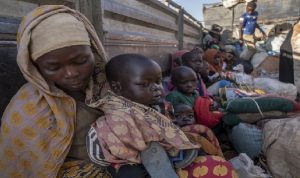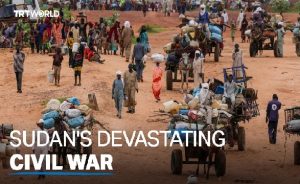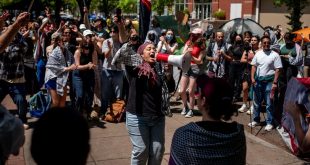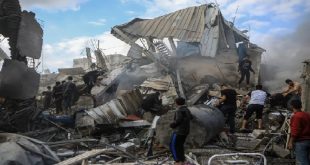17-04-2024
UNITED NATIONS/ KHARTOUM: Indiscriminate attacks against civilians in Sudan could constitute “war crimes and crimes against humanity,” UN Secretary-General Antonio Guterres has said, one year after war erupted between rival generals in the East African country.
The United Nations has said nearly 25 million people, half Sudan’s population, need aid and some eight million have fled their homes amid the war between the Sudanese Armed Forces (SAF) and paramilitary Rapid Support Forces (RSF). Donors met in Paris on Monday to pledge humanitarian help.
 “This is more than a conflict between two warring parties. It is a war being waged on the Sudanese people,” Guterres told reporters, referring to the tens of thousands of people killed and 18 million facing “acute hunger”.
“This is more than a conflict between two warring parties. It is a war being waged on the Sudanese people,” Guterres told reporters, referring to the tens of thousands of people killed and 18 million facing “acute hunger”.
“Indiscriminate attacks that are killing, injuring and terrorizing civilians could amount to war crimes and crimes against humanity,” he said, condemning the use of sexual violence against women and girls, and attacks on aid convoys.
Guterres reiterated his concerns about reports of escalating unrest in el-Fasher, in Darfur, a western region that is home to a quarter of Sudan’s 48 million people and the past scene of horrific violence, with reports of mass ethnic-based killings.
El-Fasher, in North Darfur State, is the last state capital not under the control of the RSF, who are battling Sudan’s army. It is also a major regional hub for humanitarian aid.
Fears have mounted that sexual and ethnic-based violence have taken place in Darfur since the outbreak of the war.
“Over the weekend, RSF-affiliated fighters attacked and burned villages west of the city leading to widespread new displacement” and fears that the city’s only water source could be overtaken, Guterres said.
“Fighting continued today on the outskirts of el-Fasher,” he added.
“Let me be clear: Any attack on el-Fasher would be devastating for civilians and could lead to full-blown intercommunal conflict across Darfur.”
 He warned that such an attack would also upend aid operations in an area “already on the brink of famine”.
He warned that such an attack would also upend aid operations in an area “already on the brink of famine”.
An UN-backed global authority on food security said late last month that immediate action is needed to “prevent widespread death and total collapse of livelihoods and avert a catastrophic hunger crisis in Sudan”.
When the war started in Khartoum, people across Darfur relived traumatic memories from the 2003 Darfur war. They knew they would not be spared.
In 2003, al-Bashir exploited ethnic tensions to undermine political grievances, starting an inferno that devoured Darfur for years and killed about 300,000 people from armed conflict and the disease and famine the war brought, according to rights groups.
Darfur is often referred to as being inhabited by “Arab” and “non-Arab” tribes – both are Black, Muslim tribes who embrace two different ways of life and have lived side by side and intermarried for centuries.
The “Arab” tribes are traditionally camel herders or pastoralists while the “non-Arab” tribes are more sedentary farmers.
Some “non-Arab” tribes had long felt that their needs and demands were disproportionately ignored by the central government in Khartoum.
The built-up grievances led to an armed rebellion, which started when two rebel groups captured an airport in an attack on government troops in el-Fasher, the capital of North Darfur. (Int’l News Desk)
 Pressmediaofindia
Pressmediaofindia




